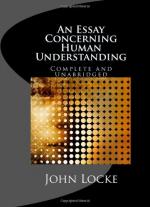
|
| Name: _________________________ | Period: ___________________ |
This quiz consists of 5 multiple choice and 5 short answer questions through Book III.
Multiple Choice Questions
1. Which grammatical particle does Locke examine in detail?
(a) On.
(b) Under.
(c) In.
(d) But.
2. What would happen if words referred to particular things, in Locke's opinion?
(a) Everyone would need to be an even larger language for classes of things.
(b) There would have to be a word for each thing.
(c) No one would know that classes of things existed.
(d) No one would understand each other's vocabulary.
3. What do we need to do with ideas over time, according to Locke?
(a) Test them.
(b) Challenge them.
(c) Abandon them.
(d) Renew them.
4. What does Locke say liberty is aimed at?
(a) Relief of suffering.
(b) Pursuit of happiness.
(c) Compassion for others.
(d) Pursuit of profit.
5. What is the philosopher's most important job, according to Locke?
(a) Arrive at truth.
(b) Demolish opponents' arguments.
(c) Recall the steps by which truth was arrived at.
(d) Clarify meanings of terms.
Short Answer Questions
1. How does Locke say ideas change over time?
2. Who is guilty of reification, according to Locke?
3. Which school of philosophy divided essences into real and nominal?
4. What does Locke say the increase of our intellectual powers follows?
5. What does Locke say is the purpose of language?
|
This section contains 215 words (approx. 1 page at 300 words per page) |

|




